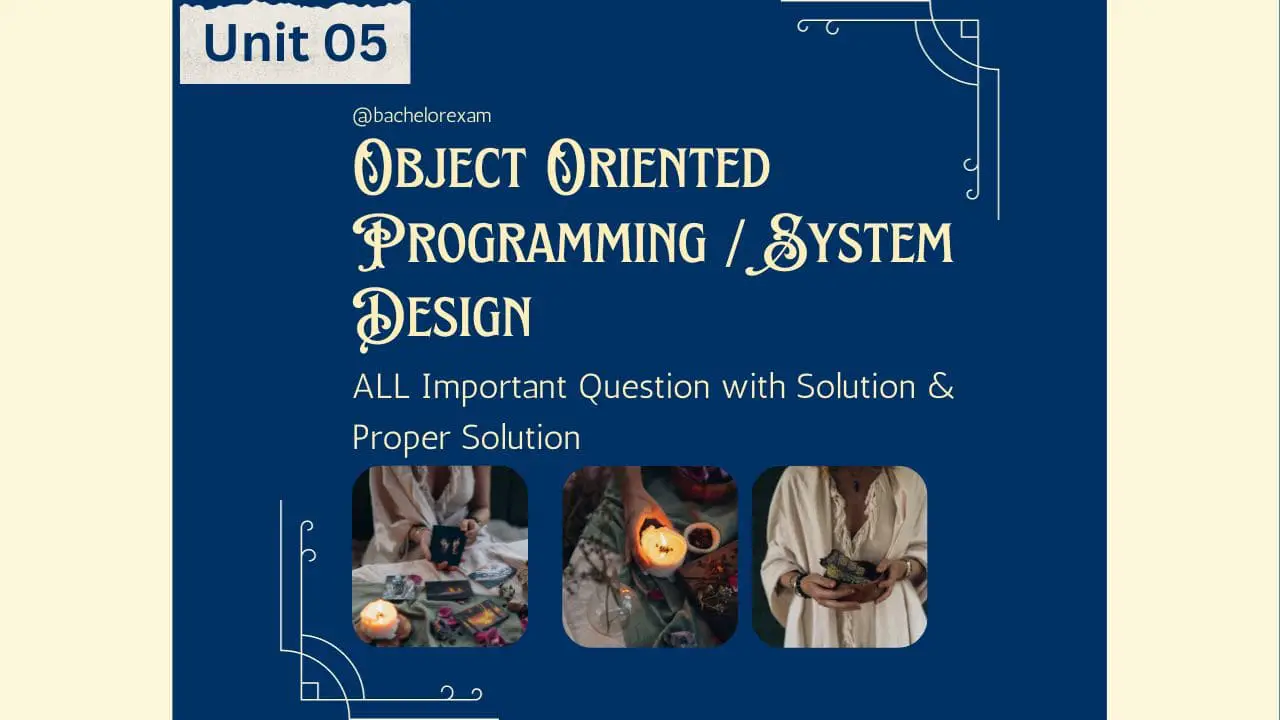Table Of Contents
With Quantum Notes on Object-Oriented Programming/System Design, you can successfully complete the Aktu Btech. For excellent test success, access important insights and commonly asked questions. today to advance your academic career! Unit-5 Object and Classes
Dudes 🤔.. You want more useful details regarding this subject. Please keep in mind this as well. Important Questions For Object Oriented Programming/System Design: *Aktu Quantum *B.tech-Syllabus *Circulars *B.tech AKTU RESULT * Btech 3rd Year * Aktu Solved Question Paper
Q1. Write short note on object and classes.
Ans. A. Object:
- 1. An Object is an instance of a Class. When a class is defined, no memory is allocated but when it is instantiated (i.e. an object is created) memory is allocated.
- 2. When a class is defined, only the specification for the object is defined; no memory or storage is allocated. To use the data and access functions defined in the class, you need to create objects.
B. Classes:
- 1. A class is a way to bind the data and its associated functions together. It allows the data (and functions) to be hidden, if necessary, from external use.
- 2. When defining a class, we are creating a new abstract data type that can be treated like any other built-in data type.
- 3. The class declaration describes the type and scope of its members.
- 4. The class function definitions describe how the class functions are implemented.
- 5. The general form of a class declaration is:
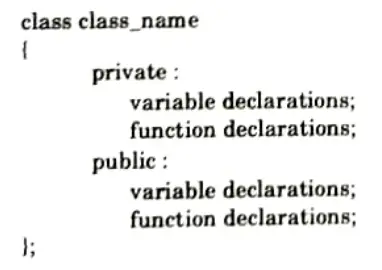


- 6. The class declaration is similar to a struct declaration. The keyword class specifies that what follows is an abstract data of type class_name.
- 7. The body of a class is enclosed within braces and terminated by a semicolon.
- 8. The class body contains the declaration of variables and functions. These functions and variables are collectively called class members.
- 9. The class members that have been declared as private can be accessed only from within the class.
- 10. While the public members can be accessed from outside the class also.
- 11. The variables declared inside the class are known as data members and the functions are known as member functions.
Q2. Explain private member function.
Ans.
- 1. A private member function can only be called by another function that is a member of its class.
- 2. Even an object cannot invoke a private function using the dot operator.
- 3. Consider a class as defined below:



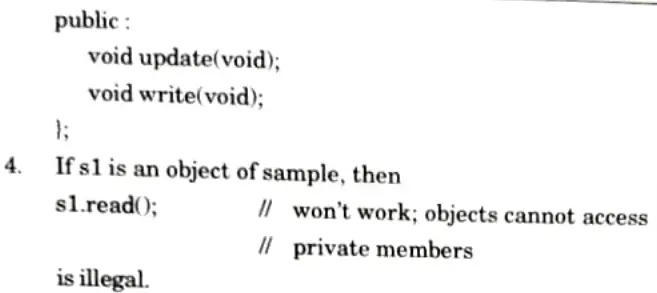


- 5. However, the function read() can be called by the function update() to update the value of m.



Q3. Explain static data and static function member.
Ans. Static data:
- 1. Static data is data that does not change after being recorded. It is a fixed data set.
- 2. Experts contrast static data with dynamic data, where dynamic data may change after it is recorded, and has to be continually updated.
Member function:
- 1. A member function of a class is a function that has its definition or its prototype within the class definition like any other variable.
- 2. It operates on any object of the class of which it is a member, and has access to all the members of a class for that object.
- 3. Member functions can be defined within the class definition or separately using scope resolution operator.
- 4. Defining a member function within the class definition declares the function inline, even if you do not use the inline specifier.
Q4. Define inheritance. What are the modes of inheritance?
Ans. Inheritance:
- 1. The capability of a class to derive properties and characteristics from another class is called Inheritance.
- 2. Inheritance is one of the most important features of Object Oriented Programming.
- 3. The class that inherits properties from another class is called Sub class or Derived class.
- 4. The class whose properties are inherited by sub class is called Base Class or Super class.
Modes of inheritance:
- 1. Public mode:
- a. If we derive a sub class from a public base class.
- b. Then the public member of the base class will become public in the derived class and protected members of the base class will become protected in derived class.
- 2. Protected mode:
- a. If we derive a sub class from a Protected base class.
- b. Then both public member and protected members of the base class will become protected in derived class.
- 3. Private mode:
- a. If we derive a sub class from a Private base class.
- b. Then both public member and protected members of the base class will become Private in derived class.
Q5. Write a program in C++ to read in two matrices from the keyboard and compute their sum.
Ans.
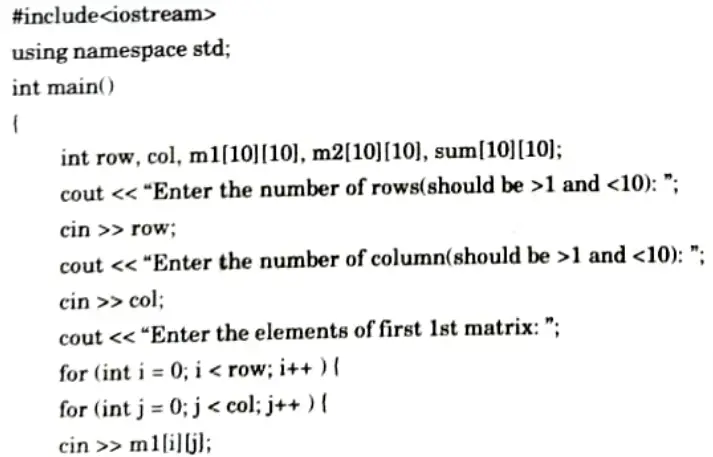


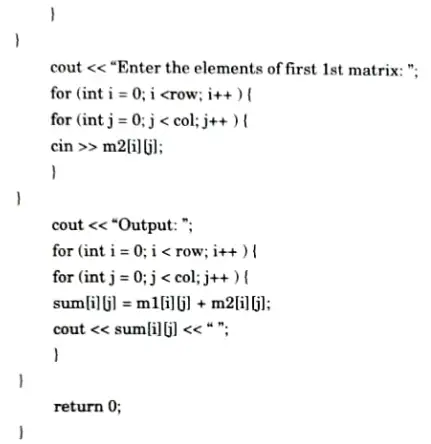


Q6. Describe briefly about the term object.
Ans.
- 1. Objects are the basic run-time entities in an object-oriented system.
- 2. In the object-oriented programming paradigm object can be a combination of variables, functions, and data structures.
- 3. They may represent a person, a place, a bank account, a table of data or any item that the program has to handle.
- 4. Programming problem is analyzed in terms of objects and the nature of communication between them.
- 5. Program objects should be chosen such that they match closely with the real-world objects.
- 6 Objects can interact without having to know details of each other’s data or code.



Important Question with solutions | AKTU Quantums | Syllabus | Short Questions
Object Oriented Programming/System Design Btech Quantum PDF, Syllabus, Important Questions
| Label | Link |
|---|---|
| Subject Syllabus | Syllabus |
| Short Questions | Short-question |
| Question paper – 2021-22 | 2021-22 |
Object Oriented Programming/System Design Quantum PDF | AKTU Quantum PDF:
| Quantum Series | Links |
| Quantum -2022-23 | 2022-23 |
AKTU Important Links | Btech Syllabus
| Link Name | Links |
|---|---|
| Btech AKTU Circulars | Links |
| Btech AKTU Syllabus | Links |
| Btech AKTU Student Dashboard | Student Dashboard |
| AKTU RESULT (One VIew) | Student Result |
